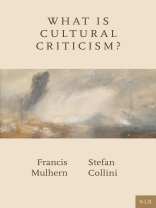In What Is Cultural Criticism?, two leading critics grapple with problems of literature, politics and intellectual practice. The debate opens with Francis Mulhern’s account of what he terms ‘metacultural discourse’. This embraces two opposing critical traditions, the elite pessimism of Kulturkritik and the populist enthusiasms of Cultural Studies. Each in its own way dissolves politics into culture, Mulhern argues. Collini, on the other hand, protests that cultural criticism provides resources for genuine critical engagement with contemporary society. Tension between culture and politics there may be, but it works productively in both directions.
This widely noticed encounter is that rare thing, a sustained debate in which, as Collini remarks, the protagonists not only exchange shots but also ideas. It concludes with Mulhern’s engagement with Collini’s writing on the subordination of universities to metrics and bureaucracy, and a companion rejoinder from Collini on Mulhern’s study of the ‘condition of culture novel’ and his essays on questions of nationality and the politics of intellectuals.
Despre autor
Stefan Collini is Professor Emeritus of Intellectual History and English Literature at Cambridge University and Fellow of the British Academy. He is a frequent contributor to The London Review of Books, The Times Literary Supplement, The Guardian, and The Nation, and he has been described by a reviewer as ‘one of Britain’s finest essayists and writers’. Other works include Common Writing: Essays on Literary Culture and Public Debate (2016), What Are Universities For? (2012) Absent Minds: Intellectuals in Britain (2006), and English Pasts: Essays in History and Culture (1999).












